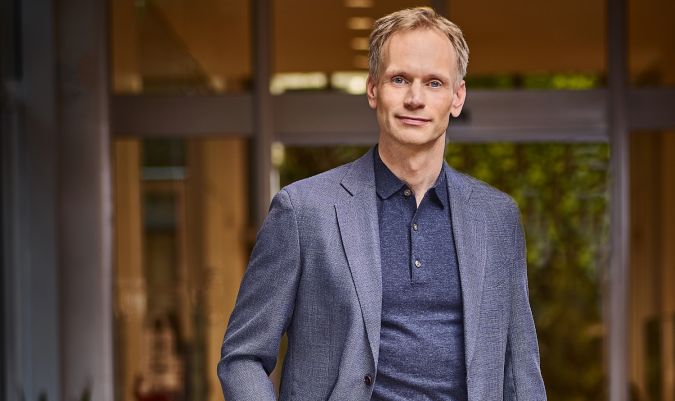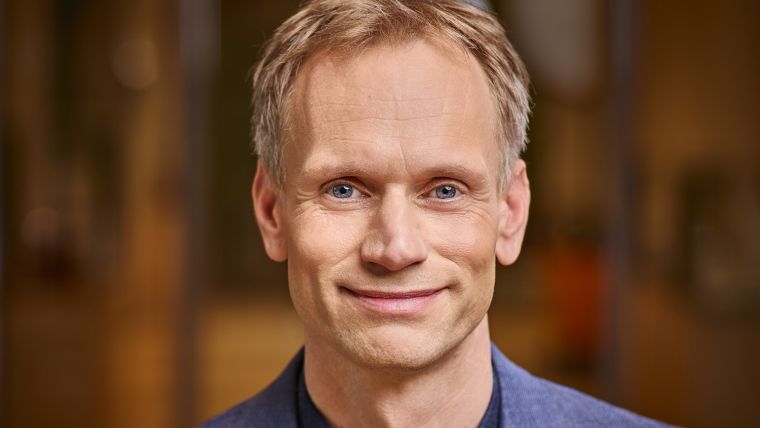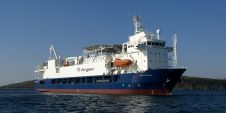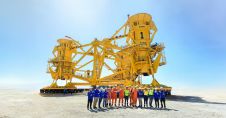Fugro's CEO: “Working for a Safer and More Sustainable World”
Interview with Mark Heine
Mark Heine is chairman of the board and CEO of Fugro, which is headquartered in the Netherlands. Fugro is among the leading and largest specialized survey companies in the world, serving the full lifecycle of assets, and describes itself as a geodata specialist. For the avid mountaineer Heine, no challenge is too great to take on, not even heading up a multinational in transition from a company largely dependent on the oil and gas industry to one that wants to co-create a sustainable and liveable world. We talked to Mark Heine about leadership styles, strategies for finding new employees, and Seabed 2030. On the topic of this ambitious project, Heine says “Commercial companies need to work together with NGOs and academia to make this happen”.
Fugro claims to support a safer and more sustainable world. How?
‘Through the nature of our work, we provide information about the earth and structures built upon it to help design, build and operate our client’s assets in a safe, sustainable and efficient manner; we are experts in understanding the risks of overusing the Earth. Also, in a company that gets half of its revenue from the oil and gas industry, but is now also doing 50% of its activities in offshore wind, infrastructure and nautical, climate change is a topic of daily discussion. Hydrography plays an increasingly large role for Fugro, also because of climate change, as we map coastlines and coastal zones to learn more about tsunami hazards or rising sea levels.
Much of Fugro’s land business has a direct impact on sustainable infrastructure development. Fugro is increasingly involved in projects that map and mitigate the impact of climate change. Growth in renewable energy is strong and has a global reach. We’ve chosen five Sustainable Development Goals, namely 7, 9, 11, 14 and 15 and their sub-goals, as focal points of our policy; we now have to work towards meeting these goals.’
Our expertise has always contributed to our purpose by creating a safe, liveable and sustainable world, but as a company, we may be a bit modest in promoting it more widely.’
How does a company that is active in over 61 countries and has almost 10,000 employees practise what it preaches?
‘An extra dimension to our purpose is that we are able to deploy our technology and expertise – that inherently contributes to a more sustainable world – in a more efficient way these days. We don’t need to send as many people offshore as we used to, so less health and safety exposure, fewer flights, lower emissions from our vessels and other measures mean that we carry out our services for our clients with a reduced carbon footprint. I dare to say that people, planet and profit are incorporated in Fugro.’
Is developing technology a part of that process?
‘Very much so. We combine innovations in technology into integrated digital solutions for our clients. We make full use of technological developments in visualisation, robotics, connectivity and advanced analytics to provide safer, faster, more efficient and better quality services; all in a more sustainable way. As an example, we are not sending fewer people offshore due to the possibilities to do a lot of work from our 7 remote control centres, where we process and analyse data onshore. The actual surveying can be done using unmanned technology, such as AUVs or ROVs.
Can you tell me a little more about the breakdown of clients per sector for Fugro? Does this breakdown reflect a shift from fossil to renewable energy?
‘As I mentioned, we are growing very fast in offshore wind, which now accounts for around 14% of our revenue. That was close to zero in 2016 and only 7% in 2017. Oil and gas have come down from 76% in 2014 to 51% last year. In nautical, although traditional hydrography for charting is falling, water and flood protection and general charting is growing and made up 7% of our revenue in 2019, from 4% in 2017.’

Where does the increase in nautical stem from?
‘Firstly, parties such as NOAA and UKHO who have always outsourced, have increased this outsourcing in recent years. Countries like Sweden and Australia are also looking at outsourcing. Australia is a particularly good example, as it is surveying vast amounts of the sea around the continent and is asking commercial parties to take care of that, at least in part. This is a logical step because it is getting harder to keep up with technology every year; not just buying new and updated hardware and software, but also keeping employees' skills up to date. Governments are looking closely at how to manage this process because they don’t want to get out of touch completely, of course. This is why some governments are even asking commercial parties like Fugro to educate staff; for example, at hydrographic offices. Secondly, there are quite a few philanthropists who are putting a lot of money into charting the seabed and the ocean, sometimes just out of a spirit of adventure and competition to get to a remote and often deep spot in the ocean for the first time. Despite the competition, we see more and more consultation and discussion taking place between these parties. Fugro also takes part in this; for example, by making our data available.'
One of the most ambitious projects in this respect might well be the GEBCO Seabed 2030 initiative, to map the entire seabed by 2030. Fugro is heavily involved in this. What does your involvement entail?
‘Seabed 2030 is in a phase in which cooperation between the commercial sector, the Nippon-Foundation and GEBCO academia is crucial to take the project to the next level. If we really want to map the entire seabed by 2030, we need to take big steps. For this purpose, we have already provided Seabed 2030 with data for hundreds of thousands of square kilometres. Technology, for example, unmanned surface vehicles, will play a crucial role. In all honesty, 2030 is impossible, because we would need a hundred years of continued surveying to reach the goal, which would mean ten vessels out there every day of the year for the next ten years.’
Crowdsourced bathymetry is often spoken of as a solution to get as close as possible to the end goal in 2030. Do you feel the same way?
‘Crowdsourced bathymetry is a reality and is happening. For example, we have deployed a lot of our vessels with survey equipment for continuous surveying, as have other commercial parties. There are hundreds of systems out there. But the complicating factor is of course that we are all sailing the same shipping routes. This has a reason: taking a more inefficient route is unsustainable and therefore counterproductive, so this is a difficult one to crack.’
Nowadays, lots of hardware manufacturers are buying software companies to be able to provide services as well. Do you see this trend as a danger to Fugro?
‘I completely understand the trend. A lot of manufacturers of survey equipment are dealing with a market that expects lower prices for products. Equipment is therefore being manufactured in cheaper countries. These companies often see it as a good strategy to offer services as well. However, that is not always easy because they are almost obliged to use their own hardware, while it may not always be the best for the job. Buying a service or software company is a good way of buying some market share. It could lead to conflicts when traditional service providers like us see suppliers turning into competitors, but so far we haven’t seen any real threats entering the market.’
Fugro is a company with a very specialised focus, other than a lot of engineering companies with a broader scope. Does that make you vulnerable?
‘Not at all. Geo is in everything and the fact that we are focusing on Geo-data and that we call ourselves Geo-data specialists makes our services interesting to all kinds of industries. We are the specialist that you want to hire if you want to know if the site you are about to develop is the right one, if you want to construct safe buildings or wind parks on that site, and if you want to monitor the site afterwards. As a company, we are crucial in multiple stages and that puts us in a very good position.’
Fugro has a lot of vacancies. Are you able to fill them easily nowadays?
‘We are looking for a lot of specialised people, such as geodesists, data analysts and specialists in, for example, site characterisation, but we also see many new positions appear through innovation and technology like C# Software Developers and C++ Developers. So it is obviously more challenging to find these people. Candidates that apply often have the right basis, and we educate them further in-house via our Fugro Academy. Recently, we launched a special programme called U.Gro, in which we pitch for Master’s students to train further. This is active now in Europe & Africa, and we will soon roll it out in the Americas and Asia-Pacific as well. We are a very culturally diverse company with many, different nationalities. We combine our global reach with a local presence. This ensures we understand local business procedures, culture and traditions and allows us to compete against local participants. Also, we like to focus on gender balance, and we are therefore specifically looking for women to come and work with Fugro. Currently, 20% of our management is female, and we want to bring that up to 25% as soon as possible.’
What is your leadership style?
‘I am a fervent believer of teamwork. I am not an authoritarian leader. I believe that a good team will reach higher goals than an individual. That is how I try to manage as well. In my first full year of being a CEO, it was very important to shape a team around me that works well together. We have adapted the organisation at the top level and we now have a much more dynamic and diverse team, although with a lot of experience, that works closer to the business. It’s the enthusiasm and energy that we want to bring over to all levels of our organisation, and I think we are succeeding in that.’
You are known to be an avid mountain climber. Can you still make time for that?
‘Yes, sure. I try to make time every now and then to climb, although it may not be as long and as high as in earlier years, but certainly, I am still fit and like to take part in a short expedition!’
Mark Heine's Biography
Mark Heine is chairman of the board and CEO of Fugro. He graduated from the Technical University of Delft in the Netherlands as a geodesist in 2002, having joined Fugro in 2000 as a data management manager. He went on to climb the ranks in the Dutch survey and Geo-data specialist company and became managing director in 2008. In 2012, he became regional director of Europe and Africa, and in 2015 a member of the executive committee. Ten years later, he was appointed chairman of the board and CEO. Mark Heine is vice-chair of IRO.
The original version of this article was published in the March/April issue of Hydro International.

Value staying current with hydrography?
Stay on the map with our expertly curated newsletters.
We provide educational insights, industry updates, and inspiring stories from the world of hydrography to help you learn, grow, and navigate your field with confidence. Don't miss out - subscribe today and ensure you're always informed, educated, and inspired by the latest in hydrographic technology and research.
Choose your newsletter(s)
























